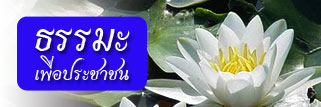Blessing Five:
Having done good deeds in one’s past
E. CONSIDERATIONS
E1. Speed of Merit Taking Effect
All we have talked about are basically the principal forces. In fact, as with the dynamics of the karma which we studied in the previous lesson, all are to some extent modified by supplementary factors or concomitants, especially with reference to the speed with which they give their fruits. The degree to which meritorious deeds will give their benefits in our lifestyle depends on four factors which we call the Four Accomplishments or Catalysts [samapatti].
The Accomplishments are the factors favourable to the ripening of good karma just like catalysts which facilitate a chemical reaction — there are four of these in all:
1. Catalytic Circumstances [gatisampatti] and means that you are born in favourable circumstances or amenable surroundings in terms of a place to live, a birthplace or a neighbourhood which will affect us for the better. To give an example suppose you are born as someone who is not particularly clever, but fortunately for you, you are born amidst catalytic circumstances — born in a prospering community with a good standard of education available to everyone. Thus with the application of a little effort in your studies, you can make up for your lack of innate cleverness with cleverness learned from your surroundings — the clear result of the catalytic circumstances. Those in possession of such circumstancses make it easier for themselves to further their good deeds during their life — and this is one way by which merit is self-catalytic.
2. Catalytic Gift of Wellbeing [upadhisampatti]. These refer to the characteristics of one's physical and personal makeup that facilitate the arising of good karma. Examples of such "gifts" might be a golden voice which makes everybody wants to listen to what you have to say (no matter whether it be good or bad!), a good singing voice (that sounds good even if you cry!), a beautiful or handsome physique (which can make you Miss Universe without having to do anything more than be born and grow up!) Someone who is gifted in this way, but who instead of sitting on his laurels, continues to do good deeds all his life will find that good deeds give their results instantly, before their very eyes.
3. Catalytic Timing [kālasampatti]. To be at the right place at the right time in the same way that we talked about the era of a world cycle when people are born. In an era where people value virtue manifest themselves right from the time you are born. You will associate with the wise right from your childhood. You need never come under the influence of fools. Throughout your life, no matter whether you are generous, keep the Precepts, meditate or do chanting, you will hear only words of encouragement from the people around you, making it easy for us to excel at any of these practices. Thus the results of one's meritorious action will be much quicker to see.
4. Catalytic Discretion [payogasampatti]. To be born with good discretion and more importantly, the moral fibre to keep to one’s principles and apply one’s discretion to one’s lifestyle will facilitate the ripening of good karma. This catalyst is centered on the ability to teach yourself to improve in all aspects will make you a born leader never having to wait for others to persuade you or force you to do beneficial things. Besides being able to discriminate between right and wrong, good and bad you will be able to put your ethics into practice. Such a personal endowment will quicken the speed with which you see the fruits of your meritorious actions at the level of the lifestyle.
In conclusion, performing merits will give the fruition of good deeds instantly at the level of the mind and the personality. There is no need to wait for the afterlife for these things. However, at the level of the lifestyle, you may have to wait much longer if you have accrued only a small amount of merit in your past. However, for those who have a lot of merit in their past lives, they will see the fruition of merits very quickly in the present lifetime. Thus those who are still skeptical about whether doing good deeds will really bring benefits to us at the level of our lifestyle, should study the mechanism of catalysts and inhibitors to the fruition of good karma as outlined in this section.
E2. Why is care needed in the study of merit?
Merit is difficult to understand because the effects of merit that we can see are the result of compounded causes. Some of the good luck or good coincidences that we see come from the merit we have stored up for ourselves from long ago. Some of the good luck will come from the acts of merit which we have done recently and which remain in mind. Thus we need to have an understanding of merit otherwise, looking at the outcomes we might come to the misunderstood conclusion that good deeds don’t give rise to merit and might give up too easily. The other aspect is to understand correctly how to do the sort of good deeds that accrue merit otherwise, again, we might come to the conclusion that our efforts to do good deeds have nothing but a disastrous effect on our future.
Some people have such a strong conviction in merit that they think that merit and demerit is the only valuable way of evaluating actions in the world. However, such a narrow view can lead to some shortcomings of understanding. To take merit seriously, can inspire you to do good deeds, avoid evil and purify the mind. However, as one of the main characteristics of merit is that it accrues exclusively to the doer of a good deed, it tends to make Buddhists disinterested in what the people around them are doing. They may become interested only in their own personal destiny without thinking to try and upgrade the state of society or show concern for the destinies of those around them. Thus, the benefit of understanding merit is to make the best of our present to ensure a bright future.
E3. Overcoming shyness to accrue Merit
It is obvious from the examination of our present circumstances that we are living in a time when the circumstances of society are not very catalytic anymore. Because of the difficulty in discerning the fruits of meritorious action, the majority of people in the world today:
1. don’t know the importance of merit;
2. know the importance of merit but don’t know how to go about accruing it;
3. know how to accrue merit, but because they have not made merit making an implicit part of their lives, they are not particularly motivated to accumulate merit.
Some people want to do meritorious deeds, but are too shy. Some people know that it is good to bow down in respect to one’s parents, but because they didn’t make bowing to their parents part of their everyday life since they were children, by the time they are old enough to realize they are too shy to start something new.
The important thing to overcome the shyness we might feel in accruing the merit in our lives is to make it a part of our daily routine so that we don’t lose touch with merit or become unfamiliar. In this respect there are three important pieces of advice for the practitioner coined as mottos for those attending Wat Phra Dhammakaya:
1. Any morning when you have not given alms, you shouldn’t allow yourself to take breakfast: You should get up in time to give alms to the monks on their almsround at dawn every day. If there is no monk on almsround you can always collect up small donations on a daily basis in a piggy-bank and offer them at the temple the next time you go. If you can manage to achieve this, you will avoid poverty in the long-term. Even if you are not particulary well off in the present lifetime, you can be assured that if you give alms every day, eventually you will put an end to the hardship of financial insecurity.
2. Any day when you don’t intend to keep the Precepts you shouldn’t dare to leave the house: Once you have taken the precepts, you should revise the intention to keep them every day for the Five Precepts. At the very least you will always be within the protection of the Five Precepts — like an armour of morality. This merit is the second major investment we have to make in our life to ensure our enduring wellbeing.
3. Any evening when you haven’t done your chanting and meditation, don't dare to go to bed: If you can manage to do your chanting and meditation every day, no matter how tired you are, you will be like the warrior who is ever ready for battle, with his sword already sharpened by his side.
If you start today and train yourself in all three of these ways, you will be like a soldier ready for battle with strength, a supply of provisions, a suit of armour and a weapon already sharp and ready for battle. However many times you go to war, you will be victorious every time. If you start living a lifestyle by which you accrue merit today, you will start to get the benefits today. There’s no need to wait for next lifetime before starting your good deeds because whether you will have the chance to do good deeds or not in your next life is dictated by the amount of good deeds you do in this lifetime. Thus start doing good deeds today, this very hour, at this very second.
In addition to the merit you cultivate as a matter of course in your everyday life, you should look for opportunities to increase your store of merit on special occasions such as offering saṅghadāna (offering a meal to the monastic community), go for a longer meditation retreat, ordain temporarily for the course of the rainy season. Don’t go thinking that you already have plenty of merit stored up from your past. You may be wrong. If you really had a lot of merit in your past, you would be able to sit comfortably for the whole of the hour long meditation session. If you still feel uncomfortable when you meditate or feel that you have to change posture, that is the sign that you still have room for improvement in the merit you have stored up for yourself. You need to use the precious life of yours to rectify your faults and weaknesses — and the best way to do this is to do as many good deeds as you can. Otherwise the hunger of the mind will go on unabated.

http://goo.gl/1ip0M








 พิมพ์บทความนี้
พิมพ์บทความนี้


























